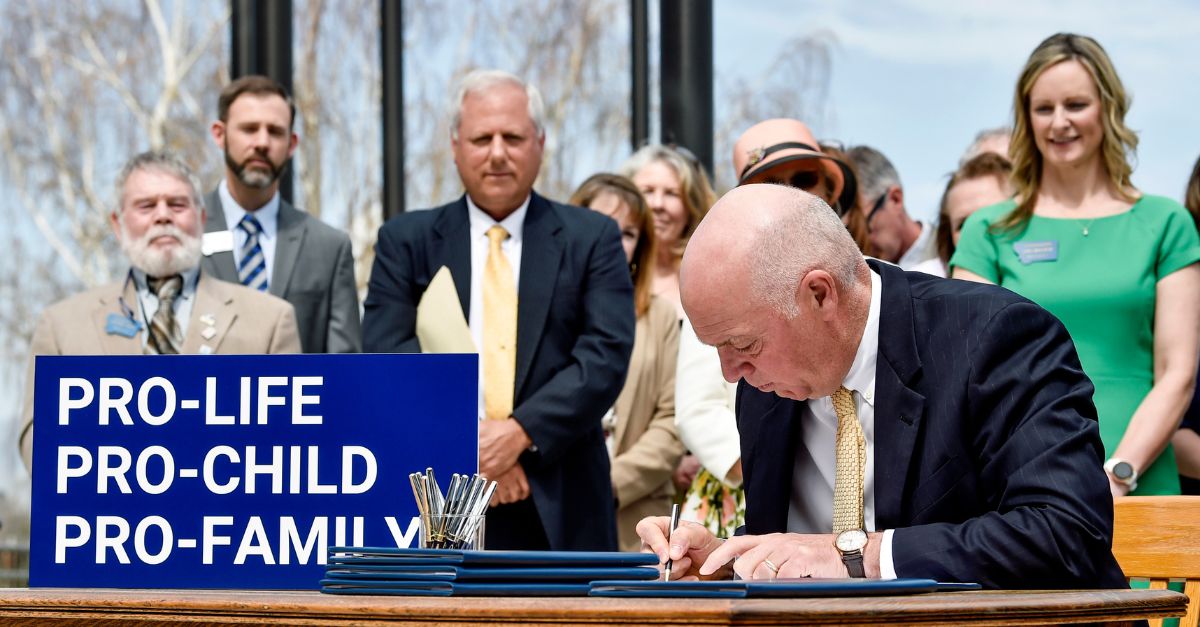
Gov. Greg Gianforte signs a suite of bills aimed at restricting access to abortion during a bill signing ceremony on the steps of the State Capitol, in Helena, Mont., on Wednesday, May 3, 2023 (Thom Bridge/Independent Record via AP).
The Montana Supreme Court unanimously struck down the state’s law requiring parental consent for a minor’s abortion Wednesday after it found that the requirement violated minors’ right to privacy in making medical decisions.
The justices ruled that Montana’s Parental Consent for Abortion Act of 2013 violates the state constitution’s guarantee that a minor may “control her own body and destiny.” The act conditioned a minor’s obtaining an abortion on parental consent or a judicial waiver — something the court noted that “a minor choosing to carry her pregnancy to term would not have to do.”
Justice Laurie McKinnon wrote for the court that “A minor’s right to control her reproductive decisions is among the most fundamental of the rights she possesses.”
In Montana, minors are guaranteed fundamental rights
The court’s decision was not based on any guarantees in the U.S. Constitution, but rather on a fundamental right to privacy guaranteed by Montana’s constitution. Under state law, minors are specifically afforded the same constitutional rights as adults — including the fundamental rights of privacy and equal protection under the law. Fundamental rights under the Montana constitution, like those under the U.S. Constitution, may only be legally infringed upon when the state is able to show that the legislation involved is narrowly tailored to a compelling interest. That analysis, known as “strict scrutiny,” is the most difficult legal standard to meet.
The Montana Constitution specifically provides that, “The right of individual privacy is essential to the well-being of a free society and shall not be infringed without the showing of a compelling state interest.” The state specifically prohibits government interference with individual medical decisions.
Indeed, McKinnon quoted from past interpretive case law:
Decisions about whom to trust with ‘intimate invasions of body and psyche,’ such as those involved in health care, must be the individual’s decision, and state regulation must be based on protecting citizens from actual health risks.
Likewise, the court found that a strict scrutiny analysis was applicable because the Consent Act singled out minors, thereby raising equal protection concerns.
The court rejected Montana’s “compelling interests” argument.
In an attempt to satisfy strict scrutiny, Montana put forth four “compelling interests” it argued justified the parental consent law: protecting minors from sexual victimization, protecting minors’ psychological and physical well-being, protecting minors from their own immaturity, and promoting parental rights.
The court immediately dispensed with any portion of the state’s argument predicated on protecting minors from a threat of physical harm. The justices said the evidence clearly established that abortion care is “one of the safest forms of medical care available in this country and the world.”
“Abortion care does not present a medically acknowledged, bona fide health risk to minors or adult women,” wrote McKinnon, who said that the state had not offered evidence to show any special health risks to minors. McKinnon also noted that both the American Medical Association and the American Academy of Pediatrics are opposed to parental consent laws for abortion.
“Moreover, the evidence establishes that receiving an abortion does not increase the likelihood of developing mental or physical side effects such as post-traumatic stress, compared to those who continue a pregnancy,” the judge wrote.
The justices similarly rejected the contention that the act protected minors from sexual victimization and found that the law was simply not narrowly tailored to achieve any such objective.
“[T]he State has failed to logically connect and justify how the Consent Act prevents victimization of minors even when teen pregnancy is the product of an assault,” wrote McKinnon. “All the Consent Act does is permit the parent to refuse consent to a pregnancy that has already occurred.”
The court agreed that the state has a compelling interest in protecting minors from their own immaturity — but called its use of a parental consent mandate “illogical” to achieve that goal. The court said that while Montana “singles out only minors seeking an abortion, and not those who choose to carry their pregnancies to term,” it allows minors to make other parenting decisions without parental consent.
The justices also rejected the parental consent law as a means of protecting parental or family rights. McKinnon allowed that, “the promotion of healthy families is undoubtedly a compelling state interest,” then noted, “But not all families are healthy.”
Allowing a parent to have what amounts to “veto power” over a minor’s abortion is allowing that parent to control a fundamental right of a minor. Such a relationship, “goes far beyond merely facilitating family involvement and guidance, and potentially establishes conflict within the family unit,” said McKinnon. Rather, “[w]here a minor seeks an abortion and that decision is vetoed by a parent, the family fundamentally is in conflict,” the judge wrote.
The court said that whatever parental rights exist under Montana law are those to be “free from state interference,” and not a right to use state power to “gain greater control over a child or to make it more difficult for a minor to exercise their fundamental rights.”
Justice Jim Rice authored a solo concurrence in which he agreed with the outcome in the case, but voiced dissatisfaction with the length of time the case took to work its way through the courts. Rice said pregnant minors seeking an abortion should not be compared to pregnant minors not seeking an abortion, but rather, to pregnant adults seeking an abortion.
Martha Fuller, the president and CEO of Planned Parenthood, the organization that challenged the law, said the decision, “affirms the right to privacy and we are pleased that the Court upheld the fundamental rights of Montanans today.”
Chase Scheuer, a spokesperson for the Montana attorney general’s office, said in an email to Law&Crime Thursday that the decision proves that the Montana Supreme Court is “radical and out-of-touch,” and said the decision is proof that “the justices sided with their campaign donors,” rather than “protect the health and well-being of babies and children.”
Scheuer called it “ludicrous” not to inform parents before what he referred to as “a major medical procedure,” and said that a majority of Montanans agree.
“In 2012, 70 percent of Montanans supported a parental notice act, which was also challenged by Planned Parenthood and is going to trial,” Scheuer said. “After 11 years of litigation, the Supreme Court took that right away from parents across the state.”
“What will the court decide next, that parents don’t need to consent to their child’s underage marriage?” Scheuer asked.
Scheuer said that Montana Attorney General Austin Knudsen, a Republican, is reviewing possible next steps in the case, but vowed that Knudsen, “will continue to protect the health and well-being of young women in Montana.”
Knudsen won the election for attorney general in 2020 and is running for reelection in 2024. In 2023, special counsel Timothy Strauch filed 41 counts of prosecutorial misconduct against Knudsen for defying orders regarding production of documents by the Montana Supreme Court. Strauch maintained that Knudsen and others in his office undermined public confidence in the judicial system during communications with Republican legislators.
Montana Gov. Greg Gianforte, also a Republican, issued a statement Wednesday criticizing the ruling:
As a strong defender of parental rights, I’m deeply concerned and disappointed by today’s ruling from the Montana Supreme Court, which states parents do not have a fundamental right to oversee the medical care of their young daughters. In its ruling, the Court has wielded its gavel like a hammer against one of the fundamental rights in our history: the right of parents to consent to the medical care of their minor children.
You can read the full ruling here.
Have a tip we should know? [email protected]








